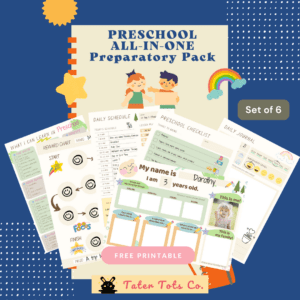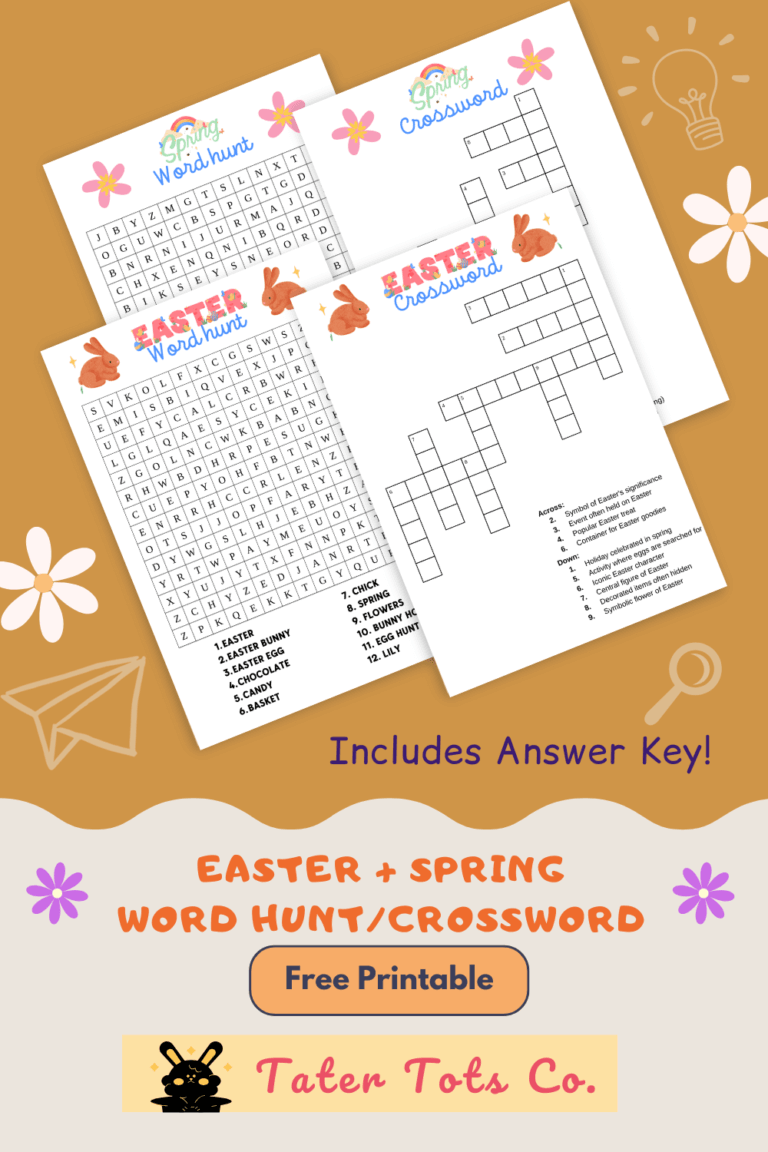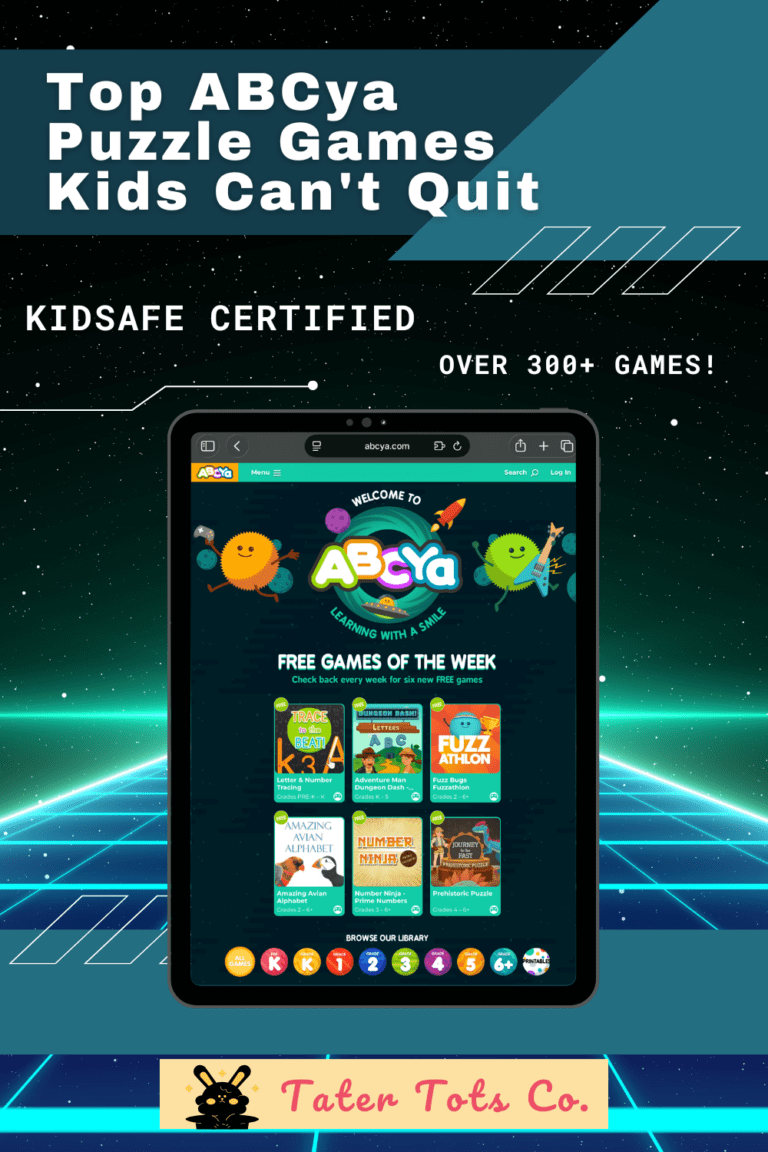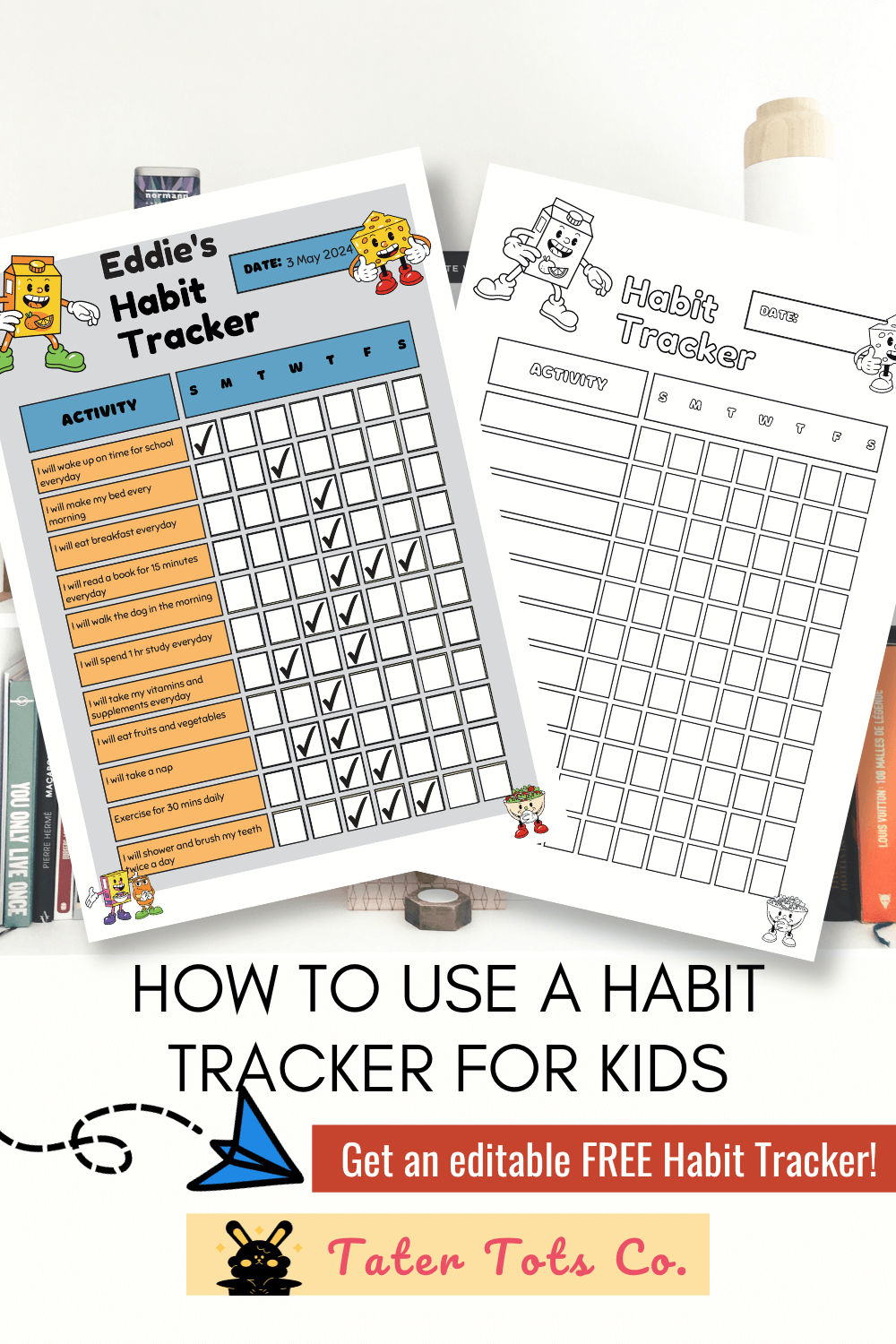
How To Use A Habit Tracker With Kids: Free Printable
Introduction
Life can get chaotic, with so many things going on with work, family, and kids. How can we better take care of ourselves and family while maintaining a proper work-life balance?
As parents, we all want our children to succeed in life. A crucial component of success is developing good habits. But how do we encourage our children to form healthy habits that will carry them to a lifetime of success? The answer is habit trackers. Habit trackers are a powerful tool that can help your child develop valuable habits, such as reading, exercising, and practicing good hygiene.
In this article, we will discuss how habit trackers work, why they are effective, and how you can use them to help your child develop good habits. Let’s embark on this journey together and empower our children to thrive through the power of positive habits.
Continue reading and download a free Personalized Editable PDF copy of a simple Habit Tracker for kids!
Related Articles:
26 Affirmation Alphabets that instill Good Habits and Traits
Reward Good Behavior During Easter (Free Reward Chart)
How to establish a good reward system for kids
5 Proven Ways To Teach Your Kids Healthy Decision-Making Skills
The Importance of Habits for Kids’ Success
Establishing good habits from a young age is crucial for children’s overall success and development. Habits shape the way children think, behave, and ultimately, their future outcomes. By instilling positive habits early on, parents and educators can help children unlock their full potential and set them on a path to success.
Habits are the building blocks of life. They provide structure, discipline, and a sense of routine, which are fundamental for a child’s growth and well-being. Good habits, such as regular exercise, consistent study routines, or practicing kindness, not only contribute to academic achievements but also promote emotional intelligence and overall personal growth.
Research has shown that habits are formed through consistent repetition and reinforcement. When children engage in certain behaviors repeatedly, they become ingrained in their daily lives, ultimately becoming second nature. By introducing habit trackers, parents, and educators can actively participate in monitoring and encouraging positive behaviors, making it easier for children to adopt and maintain beneficial habits.
Habit trackers provide a visual representation of progress and achievements. Seeing their accomplishments visually can boost children’s motivation and self-esteem, encouraging them to continue practicing positive habits and striving for further improvement.
Understanding habit trackers: What are they and how do they work?
Habit trackers have gained significant popularity in recent years as valuable tools for personal development and goal achievement. But did you know that habit trackers can also be incredibly beneficial for kids? Understanding what habit trackers are and how they work is the first step in unlocking their power and helping children cultivate positive habits.
In essence, habit trackers are visual tools that allow individuals to track their progress and monitor their habits over time. They provide a clear and tangible representation of goals and habits, making it easier for children to stay motivated and accountable. Habit trackers can take various forms, from simple checklists to more elaborate charts or digital apps.
The fundamental principle behind habit trackers is the concept of repetition and consistency. By consistently tracking their habits, children become more aware of their actions and develop a sense of responsibility toward their goals. Whether it’s completing daily chores, practicing a musical instrument, or reading for a certain amount of time each day, habit trackers provide a structured framework for children to track and improve their habits.
The visual nature of habit trackers is particularly beneficial for kids. It allows them to see their progress at a glance, which can be incredibly motivating and rewarding. As they experience the satisfaction of filling in each box or checking off completed tasks, children develop a sense of accomplishment and pride in their achievements. This positive reinforcement encourages them to continue striving towards their goals and forming positive habits.
Moreover, habit trackers can also help kids develop important life skills such as time management, organization, and self-discipline. As they track their habits consistently, they learn to prioritize their responsibilities, manage their time effectively, and establish a structured routine. These skills are not only valuable in their current endeavors but also set a strong foundation for future success.
Habit trackers are powerful tools for kids to cultivate positive habits and unlock their full potential. By understanding what habit trackers are and how they work, parents and educators can harness their power to motivate children, build essential life skills, and pave the way for long-term success.
Benefits of habit trackers for kids: How they can promote discipline and responsibility
Habit trackers for kids are powerful tools that can have a significant impact on promoting discipline and responsibility. By introducing habit trackers into their daily routines, parents can unlock the potential for their children to develop positive habits and behaviors.
Other than providing a visual representation of progress. As children mark off each completed task or habit on their tracker, they can see their accomplishments building up over time. This visual reinforcement serves as a motivating factor, encouraging them to continue their efforts and stay committed to their goals.
In addition to fostering discipline, habit trackers also promote a sense of responsibility. By assigning specific tasks or habits to be tracked, children learn the importance of taking ownership of their actions. They understand that they are accountable for completing the tasks they have committed to, which cultivates a sense of responsibility and self-discipline.
Habit trackers also provide a sense of structure and routine for children. By consistently tracking their habits, they develop a sense of order and organization in their lives. This can lead to improved time management and productivity, as well as a greater sense of control over their daily activities.
Furthermore, habit trackers can help children develop a growth mindset. As they strive to reach their goals and improve their habits, they learn that progress is possible through effort and perseverance. This mindset can be applied to various aspects of their lives, fostering a positive attitude towards challenges and encouraging them to continually strive for personal growth and development.
Habit trackers offer numerous benefits in promoting discipline and responsibility. By incorporating these trackers into their routines, parents can empower their children to develop positive habits, cultivate a sense of responsibility, and foster a mindset of growth and achievement.
Choosing the right habit tracker: Factors to consider when selecting a tracker
When it comes to selecting a habit tracker for kids, there are several factors to consider that can greatly impact the effectiveness and engagement of the tracker. Here are some key considerations to keep in mind:
- Age appropriateness: Different age groups have different needs and abilities. For younger children, opt for simpler trackers with visual cues and easy-to-understand instructions. Older children may benefit from more sophisticated trackers that allow for customization and goal setting.
- User-friendly interface: The tracker should have an intuitive and easy-to-use interface. Kids should be able to navigate through the tracker effortlessly, input their progress, and view their achievements. A cluttered or complicated interface may discourage their engagement.
- Customizability: Every child has unique habits they want to track. Look for a tracker that allows for customization, enabling children to set their own goals and choose the habits they want to monitor. This personalization will empower them and increase their motivation to use the tracker consistently.
- Visual appeal: Kids are more likely to engage with a habit tracker that is visually appealing and fun. Look for trackers that incorporate vibrant colors, playful designs, and maybe even some gamification elements. A visually stimulating tracker can make the habit-tracking process more enjoyable and encourage children to stick with it.
Check out our printable and digital habit-tracking calendar below specially designed for kids! - Tracking capabilities: Consider the tracking capabilities of the habit tracker. Does it offer various options for tracking habits, such as daily, weekly, or monthly? Can it accommodate different types of habits, such as chores, homework, or personal goals? Ensure that the tracker aligns with the specific habits your child wants to monitor.
- Progress visualization: An effective habit tracker should provide clear and visual representations of progress. This could be in the form of charts, graphs, or visual icons that show completed tasks or habits. Visualizing progress can be highly motivating for kids and help them stay on track with their goals.
By considering these factors when selecting a habit tracker for kids, you can choose a tool that is engaging, age-appropriate, and tailored to their specific needs.
Setting goals and defining habits: Identifying key areas for improvement
When it comes to harnessing the power of habit trackers for kids, setting goals and defining habits is a crucial step in the process. This step allows you to identify key areas for improvement and create a roadmap towards success.
To begin, take some time to reflect on your child’s current habits and behaviors. Are there any specific areas where they struggle or need improvement? It could be anything from completing homework assignments on time to cultivating healthy eating habits or even practicing good hygiene.
Once you have identified the key areas for improvement, it’s time to set goals. These goals should be specific, measurable, attainable, relevant, and time-bound (SMART goals). For example, if the area of improvement is completing homework assignments on time, a SMART goal could be: “Complete all homework assignments by 7 PM every evening for the next month.”
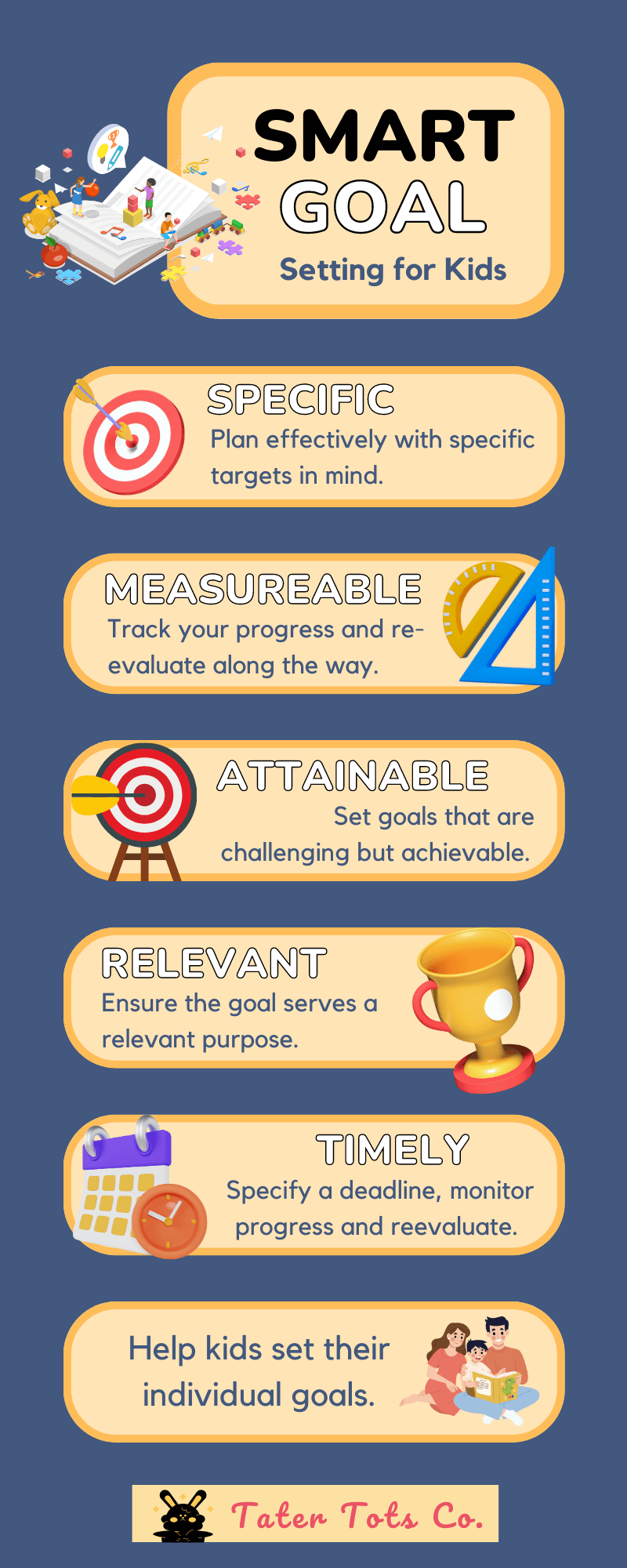
In addition to setting goals, it’s important to define the habits that will support those goals. Habits are the building blocks that contribute to long-term success. For instance, if the goal is to develop healthy eating habits, the corresponding habit could be to “eat at least one serving of fruits or vegetables with every meal.”
By setting clear goals and defining the habits necessary to achieve them, you provide your child with a roadmap for success. Habit trackers can then be used to monitor progress and hold your child accountable for their actions. These trackers can be as simple as a chart or as advanced as a smartphone app, depending on your child’s age and preferences.
Remember, the key is to make the process enjoyable and rewarding for your child. Celebrate small victories along the way and provide incentives to keep them motivated. With a clear direction and the power of habit trackers, you can unlock your child’s potential and help them develop lifelong habits for success.
Implementing habit tracking: Strategies for integrating habit trackers into daily routines
Implementing habit tracking can be an effective strategy for integrating habit trackers into the daily routines of children. By incorporating habit trackers into their daily lives, children can develop a sense of responsibility and accountability while working towards achieving their goals. Here are some strategies to help you successfully implement habit trackers for kids:
- Start with achievable goals: Begin by selecting habits that are realistic and attainable for your child’s age and capabilities. Setting small, achievable goals will increase their motivation and encourage them to continue using the habit tracker.
- Make it visual and interactive: Utilize colorful and visually appealing habit trackers that will capture your child’s attention. Consider using stickers, stamps, or symbols to mark each successful completion of a habit. This interactive approach will make habit tracking more engaging and enjoyable for the child.
- Establish a routine: Encourage your child to use the habit tracker consistently at the same time each day. Incorporating it into their daily routine will help them develop a habit of tracking their progress regularly, making it easier for them to stay motivated and committed.
- Provide rewards and incentives: Offer rewards or incentives for consistent and successful habit tracking. This can be as simple as a small treat, a special privilege, or a fun activity that your child enjoys. Rewards will reinforce positive behavior and create a sense of accomplishment for your child.
- Lead by example: Set a good example by using habit trackers yourself. Children often imitate their parents’ behaviors, so if they see you tracking your habits and making progress, they are more likely to be motivated to do the same.
- Celebrate milestones: Celebrate your child’s achievements and milestones along the way. Acknowledge their progress and provide positive reinforcement for their efforts. This will boost their confidence and encourage them to continue using habit trackers.
Implementing habit trackers for kids should be a positive and supportive experience. Encourage your child, provide guidance when needed, and celebrate their successes.
Reward systems and incentives: Motivating kids to achieve their habit goals
Reward systems and incentives play a crucial role in motivating kids to achieve their habit goals. Children, like adults, are more likely to stick to a routine or develop positive habits when they have something to look forward to. By implementing a reward system, you can create a sense of excitement and motivation, turning the habit-building process into a fun and rewarding experience.
One effective way to establish a reward system is by setting achievable milestones for your child’s habit goals. Break down their desired habits into smaller, manageable tasks or targets. For example, if their habit is to read for 30 minutes every day, you can set a milestone for completing a full week of consistent reading.
Once your child achieves a milestone, celebrate their success with a special reward or incentive. This could be anything from a small treat, extra playtime, or a fun outing to their favorite park or activity. The key is to make the reward meaningful and relevant to your child’s interests and preferences.
In addition to immediate rewards, consider incorporating long-term incentives to keep your child motivated in the long run. For example, if they consistently achieve their habit goals for a month or more, you can plan a special family outing or a small gift that they have been wanting.
Remember that rewards and incentives should be used as a positive reinforcement tool rather than a bribe. Emphasize the importance and benefits of the habit itself, while using rewards as a way to celebrate progress and maintain enthusiasm.
It is also essential to involve your child in the process of choosing rewards and incentives. This allows them to have a sense of ownership and encourages them to actively participate in their habit-building journey. By letting them have a say in selecting their rewards, you are fostering a sense of responsibility and autonomy.
By implementing a well-designed reward system and providing meaningful incentives, you can effectively motivate your child to achieve their habit goals. This not only helps in developing positive habits but also instills a sense of accomplishment and self-discipline that can have a lasting impact on their overall growth and success.
For more information on reward systems, check out our article here oh How to establish a good reward system for kids.
Tracking progress and making adjustments: Evaluating results and adapting habits as needed
Tracking progress and making adjustments is a crucial step in harnessing the power of habit trackers for kids. The beauty of habit trackers lies in their ability to provide visual feedback and accountability, allowing children to see their progress and make necessary adjustments along the way.
Once your child has been using a habit tracker for some time, it’s important to regularly evaluate the results. This can be done on a weekly or monthly basis, depending on the habits being tracked. Sit down with your child and review their tracked habits together. Celebrate their successes, such as consistently completing tasks or practicing a skill, and provide encouragement and support for areas that may need improvement.
During these evaluation sessions, it’s also essential to involve your child in the decision-making process. Ask them how they feel about their progress and if there are any habits they would like to change or adjust. This empowers them to take ownership of their habits and encourages self-reflection.
Based on the evaluation, it may be necessary to make adjustments to the habits being tracked. For example, if a particular habit proves to be too challenging or not as beneficial as initially anticipated, it can be modified or replaced with a more suitable habit. This flexibility allows for a personalized approach and ensures that the habit tracker remains effective and relevant to your child’s needs and goals.
Remember, the purpose of habit trackers is not only to track progress but also to facilitate growth and development. Evaluate results and adapt habits as needed to create an environment that fosters continuous improvement.
Encouraging long-term habits: Tips for fostering sustainable habits beyond the tracker
While habit trackers for kids can be highly effective in establishing new habits, it’s essential to focus on fostering sustainable habits beyond the tracker. After all, the ultimate goal is to help children develop long-term habits that they can carry with them throughout their lives.
Here are some additional tips to encourage sustainable habits even after the habit tracker has served its purpose:
- Provide ongoing support and guidance: Continue to offer guidance and support to your child as they work towards developing new habits. Be their cheerleader, reminding them of the importance and benefits of the habit they are trying to cultivate.
- Set realistic and achievable goals: Help your child set realistic goals that they can attain over time. Break down larger habits into smaller, manageable tasks to avoid overwhelming them. Celebrate their milestones and progress, reinforcing their motivation to keep going.
- Make it enjoyable: Incorporate elements of fun and enjoyment into the habit-building process. Find creative ways to make the habit engaging and exciting for your child. For example, if the habit is related to physical activity, organize family activities or outings that involve movement and play.
- Lead by example: Children often emulate the behavior they see in their parents and caregivers. Be a role model by practicing the habits you want your child to develop. Let them see firsthand the positive impact these habits have on your own life.
- Reinforce positive behaviors: Use positive reinforcement techniques to reward your child’s efforts and progress. This can be in the form of praise, small rewards, or even special privileges. Positive reinforcement helps to create a positive association with the habit, making it more likely to stick.
- Keep the habit relevant and adaptable: As your child grows and develops, their needs and interests may change. Ensure that the habit remains relevant and adaptable to evolving circumstances. Encourage them to modify and adjust the habit as needed, so it continues to serve a purpose in their lives.
Remember, the ultimate goal is to empower children with the skills and mindset necessary to maintain these habits independently.
Download a Free Editable Printable Habit Tracker for kids
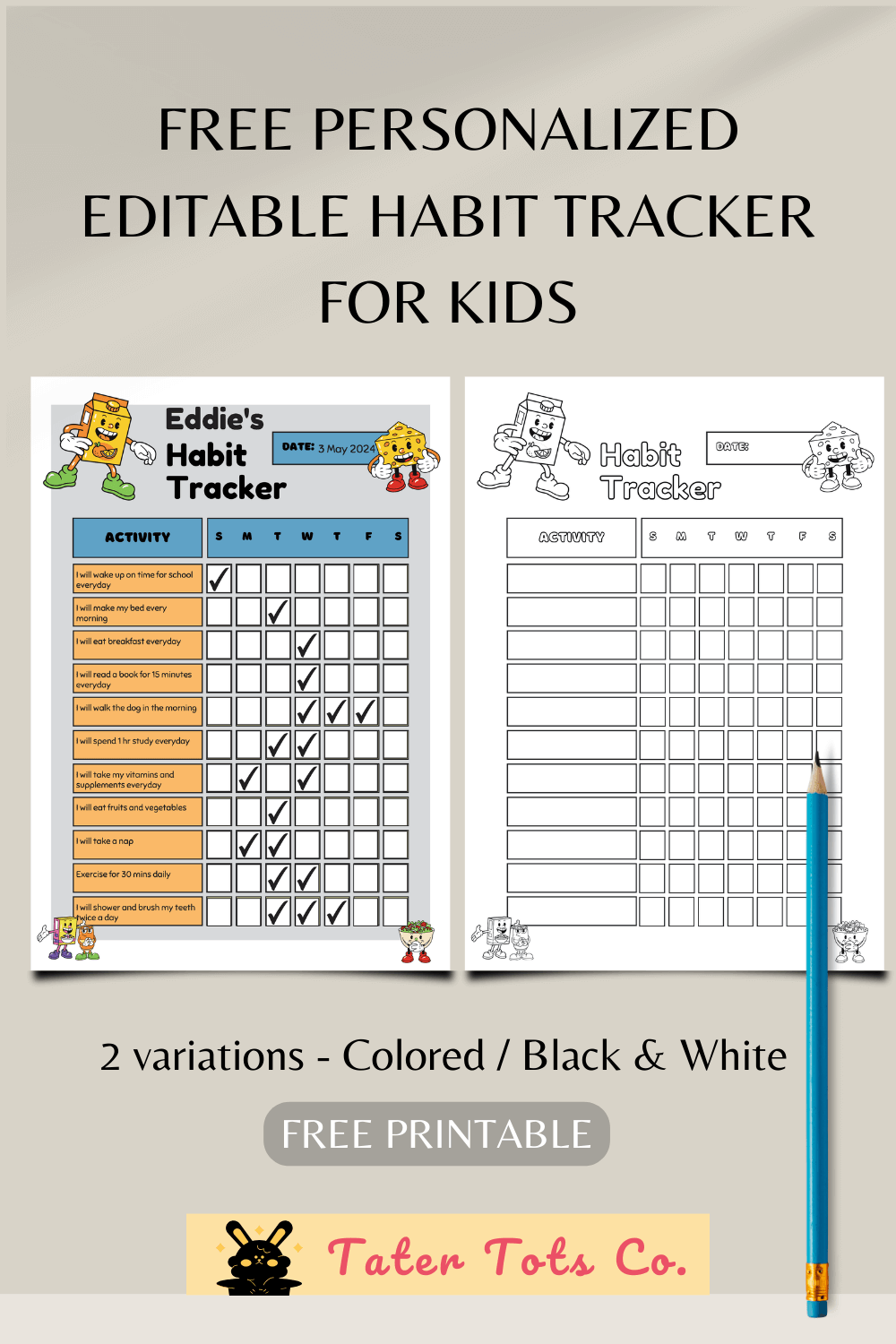
Grab a copy of your free printable habit tracker here! You will be able to fill in the text fields and checklist in this editable PDF file.
The PDF file is editable with Adobe Acrobat Reader (free download).
By downloading our free printable, you agree to our Terms & Conditions of usage.
Empowering Kids with habit trackers for lifelong Success
In conclusion, habit trackers have the potential to empower kids and set them up for lifelong success. By introducing these powerful tools into their daily routines, parents and educators can help children develop essential habits that will benefit them in various aspects of their lives.
Beyond the immediate benefits, habit trackers also cultivate important life skills. Kids learn about responsibility, time management, and prioritization as they track and prioritize their habits. They develop a sense of discipline and accountability, setting a solid foundation for future endeavors.
As children grow and mature, the habits they develop through habit trackers will become ingrained in their daily routines. These positive habits will serve as building blocks for their future success, helping them excel academically, maintain healthy relationships, and achieve personal and professional goals.
We hope you found our article on harnessing the power of habit trackers for kids insightful and helpful. Instilling positive habits in children from a young age is crucial for their personal growth and development. By utilizing habit trackers, you can effectively track and encourage your child’s progress, helping them unlock their full potential and set them up for success.
Remember, consistency is key, and with the right habit tracker system in place, you can guide your child towards a lifetime of success. Start implementing these strategies today and witness the incredible results in your child’s life.
What are your favorite tips for using habit trackers with your kids? Share them with us in the comments below!
Habit Tracking Resources
Habit trackers are a great way to help kids develop healthy habits and stay on track with their goals. They come in various forms, such as printable sheets, Google Sheets, digital formats, or even as an app.
We recommend some free Habit Trackers from other sites,
Habit Tracker Printable – Free Monthly Habit Trackers (weareteachers.com)
Habit Tracker Ideas for Moms and Kids – iMOM

Enjoyed this freebie? Don’t forget to follow us on Facebook/Pinterest for the latest blog updates, freebies, and Ukulele printables.
Subscribe to us!
Includes a FREE PRESCHOOL PREPARATORY PACK
Assess your child's readiness for preschool and know what to prepare beforehand, with printable templates included.
- Preschool Things to Bring/Pack Checklist
- What I can learn in Preschool
- All About Me toddler activity poster
- Daily activity schedule
- Preschooler's daily journal template
- Reward Chart for Behavior Management
Provide a valid email so that you can receive your freebie!


